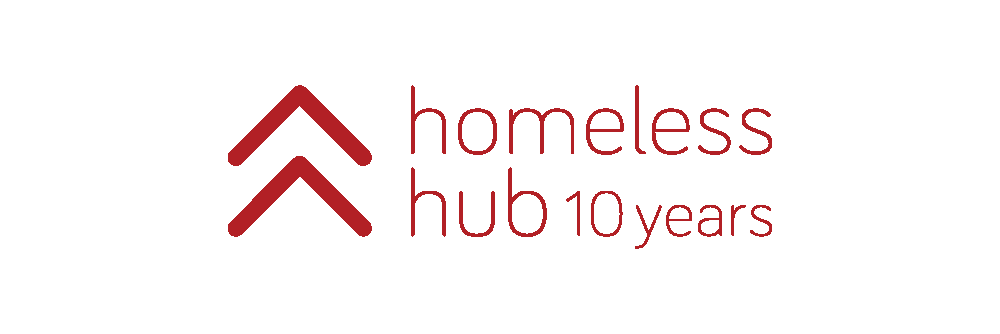Can you believe it’s already been ten years?
We launched the Homeless Hub back in 2007, after seeing the success of the very first research conference on homelessness in Canada at York University. That event opened up a dialogue about improving access to research on homelessness for researchers, government representatives and the public.
Stephen Gaetz, President and CEO of the Canadian Observatory on Homelessness talked about coming to the idea of the Homeless Hub after surveying people at that conference.
“We had a question about a research repository and people wanted more access to research…it’s really hard to get access to homelessness research because it’s not a discipline-based issue,” he said after the conference.
Determined to meet this need for more resources and information, a small team with a passion for research and ending homelessness launched the Homeless Hub website in 2007 with approximately 500 resources.
In the decade that followed, the Homeless Hub has continued to be and remains a place where service providers, researchers, government representatives and the public can access and share research, stories and best practices. The original Homeless Hub logo was a house made of puzzle pieces with blank spaces to indicate gaps in homelessness research mirrors the gap we try to bridge through our work, an idea Stephen sketched on a napkin.
In honour of our tenth anniversary, we are relaunching our logo, which was designed by chance -- our Director of Communications, Steph Vasko, had used the symbol in a mock-up for our new website (to launch in early 2018 -- stay tuned!). Staff loved the simplicity of the design and its ability to represent many things: rooftops, direction, moving forward to preventing and ending homelessness in Canada.
Today, thanks to our followers, contributors and partners, the Homeless Hub hosts nearly 30,000 diverse resources on homelessness -- a massive leap from its initial library of 500.
10 years of research
Over the past 10 years, the COH has published research on a variety of topics, including youth homelessness, Indigenous homelessness, legal and justice issues, and homelessness prevention. These publications have been shared and implemented by communities both nationally and internationally. Below are some of our most influential works, all produced in collaboration with various organizations, academics, communities and people with lived experience of homelessness.
Here are some of the milestones that shaped the COH:
Calling for prevention
We, along with our partners, have been on the forefront of advocating for a conceptual shift from simply managing the problem of homelessness to a focus on prevention, and effective and sustainable exits from homelessness. The COH launched a A Framework for Homelessness Prevention earlier this year, which sets out to lay the groundwork for policy and practice shifts that will reduce the likelihood that individuals will experience homelessness. A youth homelessness prevention framework is currently in the works and will be available in early 2018.
Defining homelessness
The COH also recognized that to develop collective solutions to homelessness, we need a consistent vocabulary to describe the issue. Released in 2012 and recently updated, the COH, in collaboration with dozens of partners, developed The Canadian Definition of Homelessness. The COH's definition intends to improve understanding, measurement and responses to homelessness in Canada by providing a common language for addressing this complex problem. The definition also recognizes that homelessness is more than a social problem; it's a human rights violation. Since then, we also released the Definition of Youth Homelessness in Canada, the Canadian Definition of Ending Homelessness and just last month, the Definition of Indigenous Homelessness in Canada.
The State of Homelessness in Canada reports
In partnership with the Canadian Alliance to End Homelessness, we published three State of Homelessness in Canada reports (2013, 2014, 2016). Within these reports, we estimate the national prevalence of homelessness and look critically at the progress that has been made locally, provincially and nationally over the course of a year. The State of Homelessness reports are widely regarded as the most reputable estimates of homelessness in Canada.
Advocating rights of youth experiencing homelessness
The COH has also been active in inspiring a global shift in how we respond to youth homelessness. In 2010, we published Surviving Crime and Violence: Street Youth and Victimization in Toronto. This report proved instrumental in its findings, indicating concerns not effectively addressed by the criminal justice and shelter systems. The following year, we released Can I see your ID? The Policing of Youth Homelessness in Toronto which looked at the problematic use of law enforcement as a way to address homelessness in Toronto.
More recently, we conducted the largest ever pan-Canadian study on youth homelessness. With over 1,100 respondents, the National Youth Survey provides an unprecedented understanding of the experiences of homeless youth. The results of the survey lead to the creation of two policy briefs: Child Welfare and Youth Homelessness and Mental Health Care for Homeless Youth, along with extensive media coverage of the issue. This year, the COH continued its work on youth homelessness by publishing Where Am I Going to Go?: Intersectional Approaches to Ending LGBTQ2S Youth Homelessness in Canada and the U.S., a book that addresses the issues LGBTQ2S homeless youth experience.
-
This is just a brief snapshot of the work we’ve produced in collaboration over the years. We strongly believe that research can, and should, contribute to solutions on homelessness. We look forward to continuing to be the place to access homelessness research and resources and thank you for contributing to the success of the Homeless Hub. Stay up to date by following us on Facebook, Twitter and Instagram.



